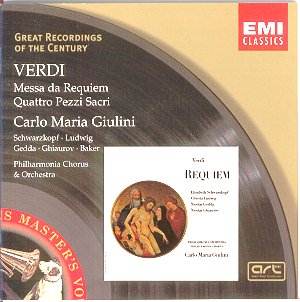VERDI Giuseppe
Messa da Requiem*, Quattro pezzi sacri**
 Elisabeth Schwarzkopf (soprano)*,
Christa Ludwig (mezzo-soprano)*, Nicolai Gedda (tenor)*, Nicolai Ghiaurov
(bass)*, Janet Baker (mezzo-soprano)**, Philharmonia Chorus and Orchestra/Carlo
Maria Giulini
Elisabeth Schwarzkopf (soprano)*,
Christa Ludwig (mezzo-soprano)*, Nicolai Gedda (tenor)*, Nicolai Ghiaurov
(bass)*, Janet Baker (mezzo-soprano)**, Philharmonia Chorus and Orchestra/Carlo
Maria Giulini
Recorded 1963-4*, 1962**
 EMI Great Recordings of
the Century CMS 5 67560 2 [2 CDs, 67'02",
61'43"]
EMI Great Recordings of
the Century CMS 5 67560 2 [2 CDs, 67'02",
61'43"]
Crotchet
£17.00
Amazon
UK £17.99 Amazon US

The problem with recordings of this age is that they do not seem old enough
to warrant the allowances we make for material derived from 78s and early
mono LPs, but nor do they always entirely satisfy. More than actual distortion,
of which there are only occasional traces as the choral sopranos ascend to
fortissimo Bs and Cs, there is a certain woolliness about the sound, and
the stereo images suggests that orchestra and chorus were not in their usual
positions but just scattered around the studio anywhere. The slightly earlier
recording of the Four Sacred Pieces is actually a little clearer. I don't
want to give the idea that the sound is really bad, but it may not have helped
my reactions to the performance.
Over the years generations of great Verdi conductors have demonstrated that
performances of his works need that untranslatable word slancio together
with a firm rhythmic groundswell which carries the music inexorably forward
even over the longest dramatic span. For many, Giulini is among the great
Verdi conductors, and here there are many marvels of lovingly shaped phrasing
(and he is fortunate in having soloists who can sustain his slow tempi with
absolutely no sign of strain). But for me the whole thing flounders because
there is not the necessary rhythmic grip to hold it up. And when a performance
lasts about 15 minutes longer than the norm this has a cumulative effect
not evident when listening to individual sections. As one longer-than-usual
movement follows another tension is dissipated and a boredom sets in which
all Giulini's sincerity and inner conviction cannot alleviate.
Turn to another classic performance, the 1954 Fricsay, and hear how the
Lacrimosa, for one, surges powerfully onward with no hint of haste
while Giulini's gets bogged down by the heavy spelling out of the accompanying
chords. And go where you will with your comparisons, it's the same story
in every movement. Fricsay hasn't quite such good soloists (fine though they
are, especially Maria Stader) and the mono recording distorts at climaxes,
but the sound picture is clearer.
The Four Sacred Pieces are more suited to Giulini's approach and only the
Te Deum is occasionally sapped of its coursing energy. The Stabat Mater is
highly expressive.
It gives me no pleasure to write what may be seen as a nasty exercise in
debunking. Richard Osborne's booklet notes state the case for the defence.
A CD booklet would presumably not have been the place for doing otherwise
but I have no doubt of his sincerity when he describes the performance, quoting
Verdi's own words about Manzoni's principal work, as "a comfort to humanity",
and I am sure very many readers will agree. I, too, have to be sincere and
can only record that it does precious little for me.
The booklet includes the original texts and translations into English, German
and French.
Christopher Howell


